Main points
- Choose apps based on your marketing goals.
- Start with 1-2 apps addressing your most urgent needs.
- Track KPIs to evaluate app effectiveness.
- Consider integrating different apps for synergy.
- Ensure apps don’t negatively impact user experience.
- Continuously test, learn, and optimize your marketing strategy.
- Audit current tools and identify areas for improvement.
- Trial the most impactful apps.
- Develop methods to measure success.
- Stay open to new tools and strategies.
Introduction
Are you looking to supercharge your Shopify store’s marketing efforts? You’ve come to the right place.
In today’s competitive e-commerce landscape, having a great product is just the beginning. To truly succeed, you need powerful marketing tools that can help you reach more customers, boost sales, and grow your business.
But with thousands of apps in the Shopify App Store, how do you know which ones are worth your time and money?
That’s where this guide comes in. We’ve done the hard work for you, sifting through countless options to bring you a curated list of the best Shopify marketing apps in 2024. Whether you’re looking to:
- Build your email list
- Recover abandoned carts
- Boost your social media presence
- Optimize for SEO
- Or anything in between
We’ve got you covered with top-rated apps that can take your marketing to the next level.
Ready to discover the tools that could transform your Shopify store? Let’s dive in and explore the cream of the crop when it comes to Shopify marketing apps. By the end of this guide, you’ll be armed with the knowledge to make smart choices for your store’s marketing stack.
What are the key areas you’re looking to improve in your marketing? And how much time are you currently spending on marketing tasks that could potentially be automated? Keep these questions in mind as we explore the best tools to streamline and supercharge your efforts.
Email Marketing Tools
Now that we’ve set the stage, let’s dive into one of the most crucial aspects of any e-commerce marketing strategy: email marketing. Why is email marketing so important for Shopify stores? Consider this: for every $1 spent on email marketing, the average return is $42. That’s a 4,200% ROI!
But how do you harness the power of email marketing effectively? The right tools can make all the difference. Here are some of the best Shopify marketing apps for email:
Klaviyo: Email Marketing & SMS
Shopify Rating: 4.6/5 stars
Klaviyo is a powerhouse when it comes to email marketing for e-commerce. It offers deep customer segmentation, allowing you to target your audience with laser precision. Some key features include:
- Automated email flows for abandoned carts, welcome series, and more
- Personalized product recommendations based on customer behavior
- Integration with Facebook for custom audiences and retargeting
Did you know? Stores using Klaviyo’s abandoned cart emails recover an average of 3-5% of abandoned carts. That’s revenue you might be leaving on the table!
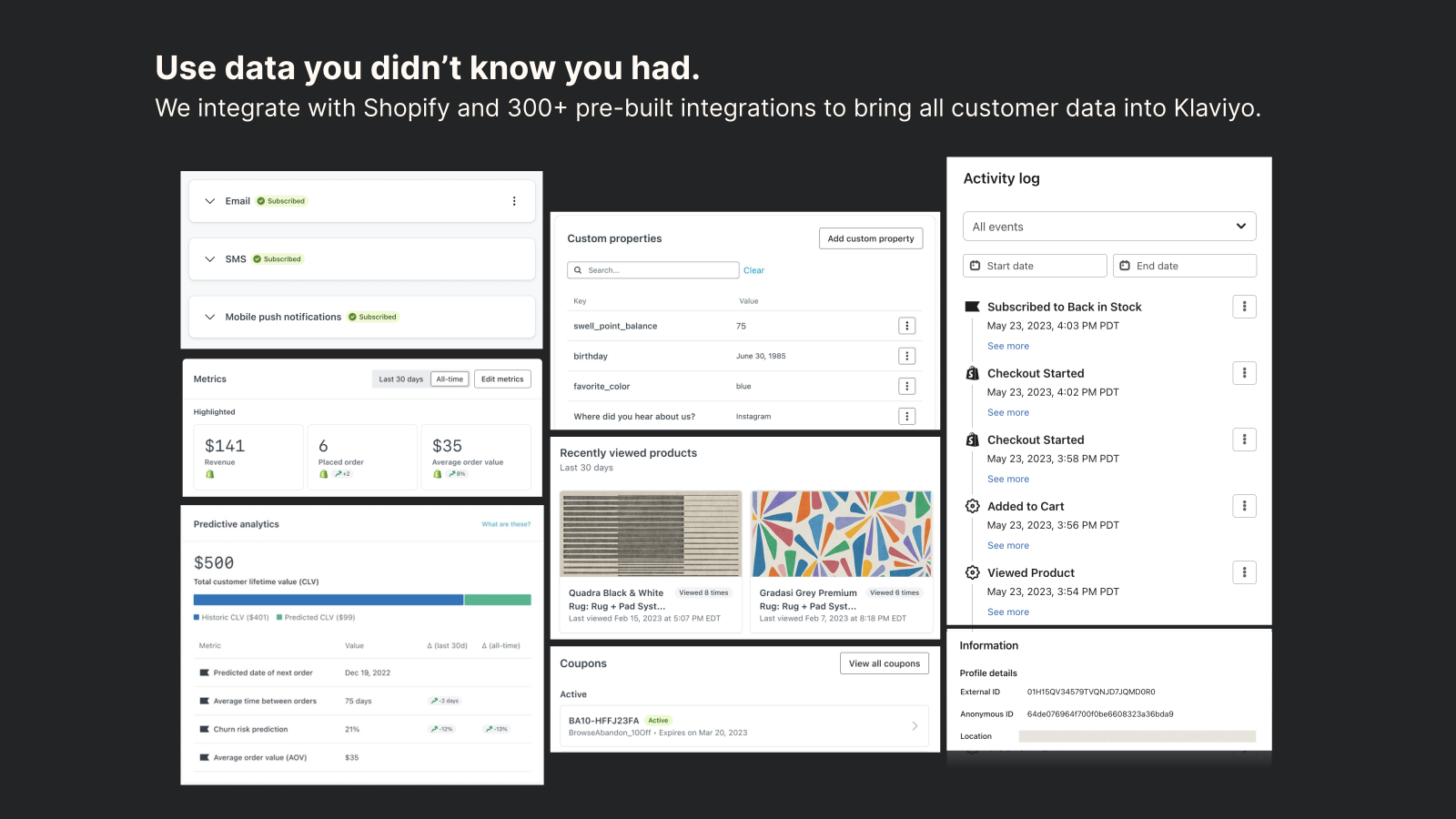
Omnisend Email Marketing & SMS
Shopify Rating: 4.7/5 stars
Omnisend is another top contender, offering a user-friendly interface and powerful automation features. Highlights include:
- Pre-built automation workflows for various customer journeys
- Easy-to-use email builder with drag-and-drop functionality
- SMS marketing capabilities for an omnichannel approach
Fun fact: Omnisend users report an average of 37% higher conversion rates when combining email, SMS, and web push notifications in their campaigns.
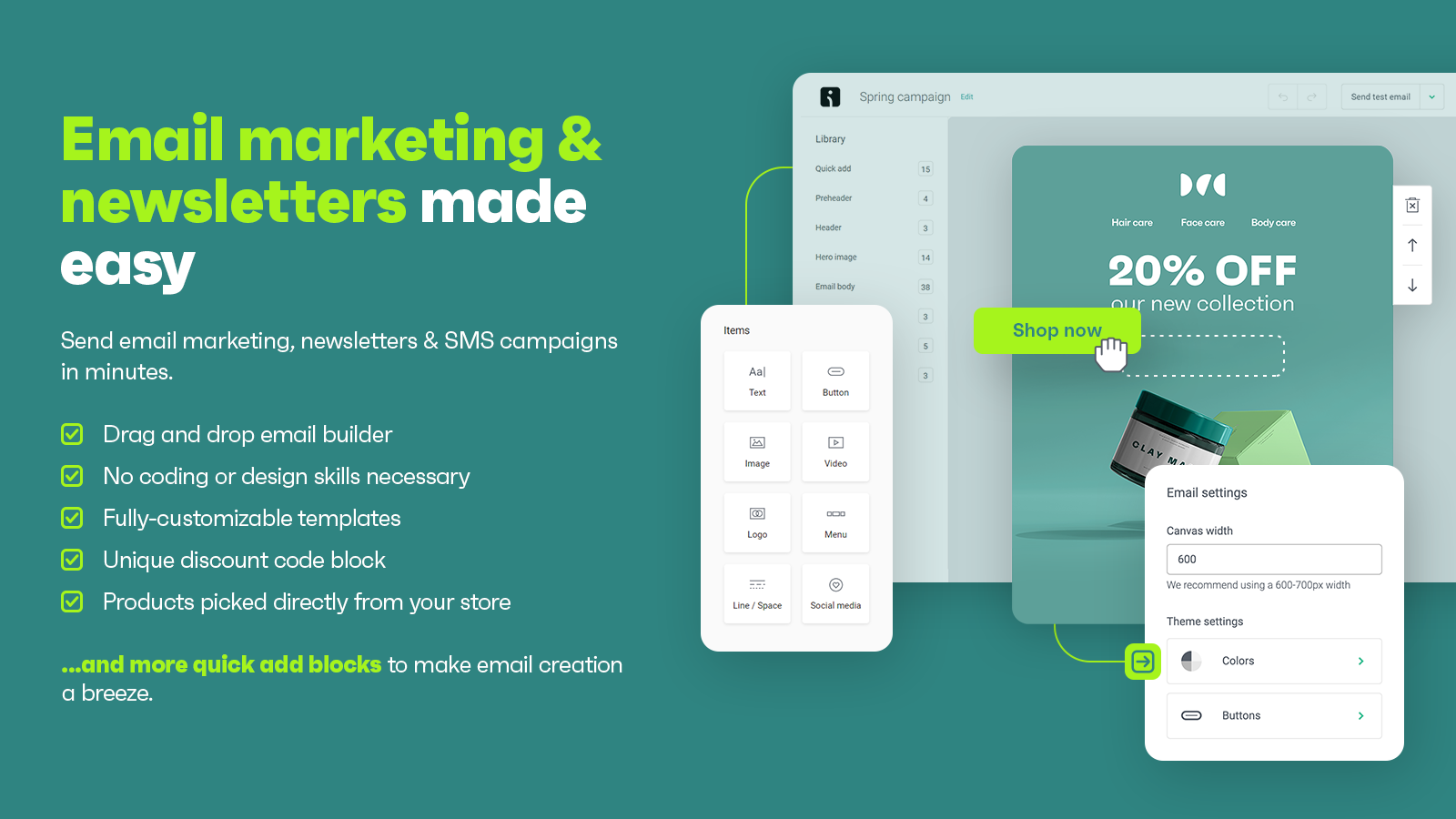
Shopify Email
Shopify Rating: 4.5/5 stars
For those just starting out or looking for a native solution, Shopify’s own email marketing tool is worth considering. It’s free for up to 10,000 emails per month and offers:
- Seamless integration with your Shopify store
- Pre-designed email templates tailored to your brand
- Easy tracking of email performance right in your Shopify dashboard
Are you currently using any of these email marketing tools? If not, which features stand out to you as most valuable for your business?

Remember, the key to successful email marketing isn’t just sending emails – it’s sending the right emails to the right people at the right time. These tools can help you do just that, automating much of the process so you can focus on growing your business.
In the next section, we’ll explore apps that can help you recover abandoned carts – a common challenge for many Shopify store owners. But first, take a moment to think: how could better email marketing improve your customer relationships and boost your bottom line?
Social Proof and Review Tools
Building on the power of email marketing, let’s explore another critical aspect of e-commerce marketing: social proof and customer reviews. After all, what could be more persuasive than hearing from satisfied customers?
Did you know that 93% of consumers say online reviews impact their purchasing decisions? With numbers like that, it’s clear that leveraging social proof can be a game-changer for your Shopify store. But how do you effectively collect and showcase customer reviews? Let’s look at some top-rated apps that can help:
Loox: Photo Reviews and Social Proof
Shopify Rating: 4.9/5 stars
Loox is a powerhouse when it comes to collecting and displaying photo reviews. Key features include:
- Automated review request emails with photo upload incentives
- Customizable review displays for your product pages
- Instagram-style photo carousels to showcase customer images
Here’s an impressive stat: Loox users report an average 9.6% increase in conversion rates after adding photo reviews to their stores. Could your store benefit from such a boost?
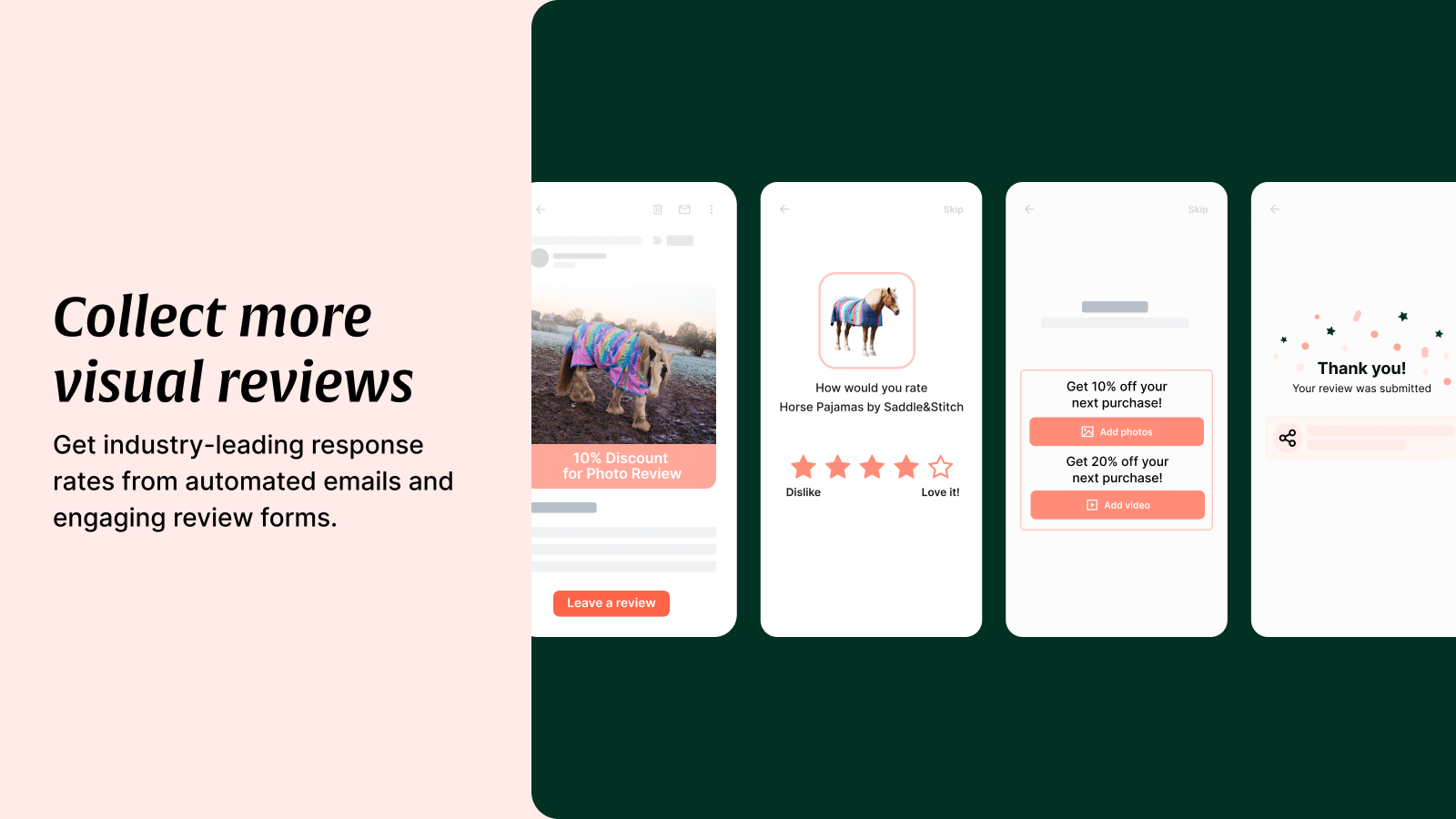
Judge.me: Customizable Review Widgets
Shopify Rating: 5.0/5 stars
Judge.me offers a wide range of customization options for collecting and displaying reviews. Notable features:
- Fully customizable review request emails and forms
- Ability to import reviews from other platforms
- SEO-friendly rich snippets for better search engine visibility
Did you know? Judge.me users have collected over 100 million reviews across their stores. That’s a lot of social proof!

Yotpo: Comprehensive User-Generated Content Platform
Shopify Rating: 4.8/5 stars
Yotpo goes beyond just reviews, offering a complete user-generated content solution. Standout features include:
- AI-powered review request system for optimal timing
- Visual marketing tools to turn reviews into shareable content
- Loyalty and referral programs to encourage more reviews
Interesting fact: Yotpo found that products with user-generated photos have a 40% higher chance of being purchased. Are you leveraging customer photos in your marketing?
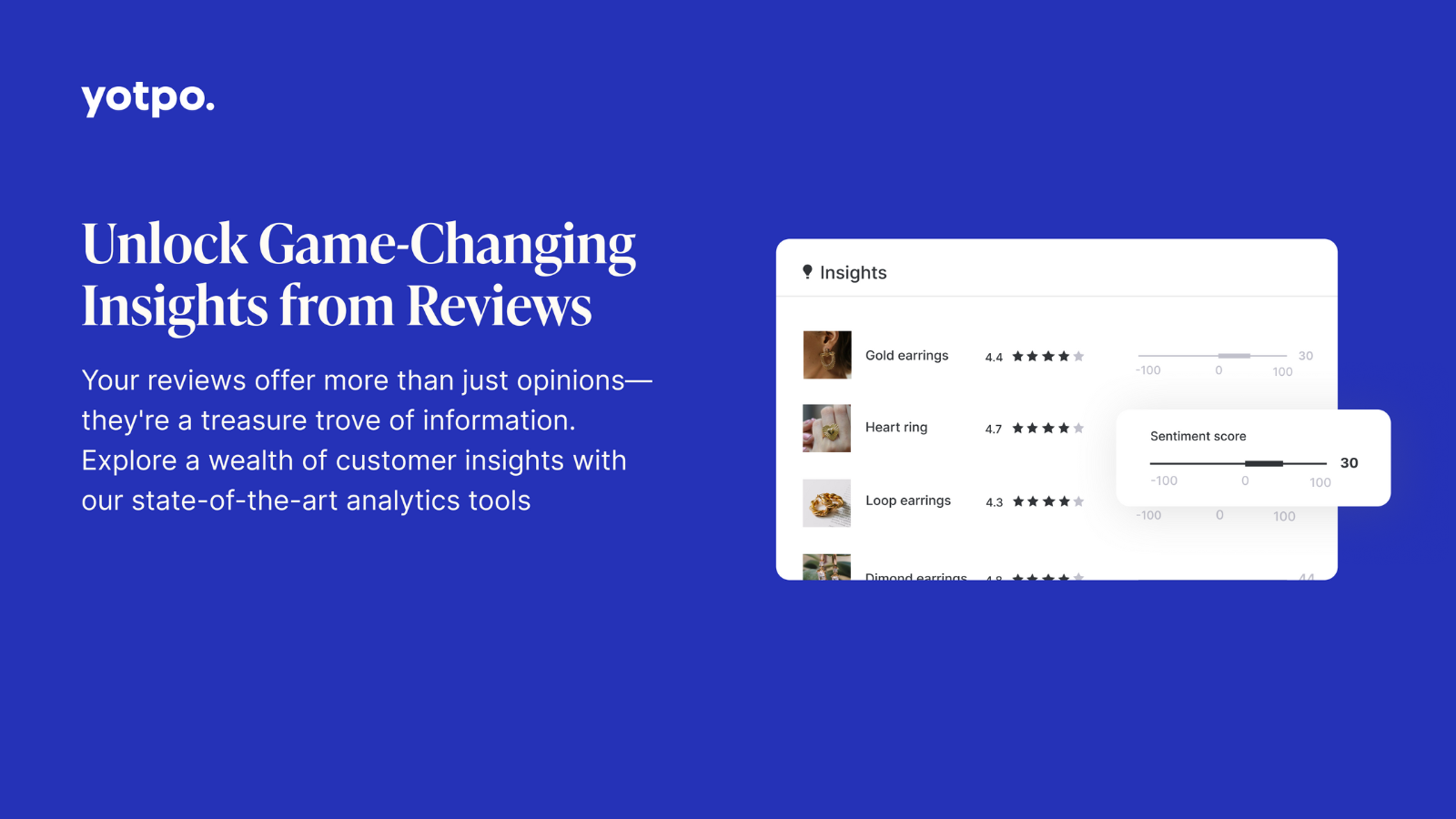
When choosing a review app, consider:
- How easy is it for customers to leave reviews?
- Can you customize the look and placement of reviews on your site?
- Does the app offer features to help you generate more reviews?
Remember, social proof isn’t just about collecting reviews – it’s about strategically using them to build trust and drive sales. These apps can help you do just that, turning your satisfied customers into your best marketers.
What aspects of social proof do you think would have the biggest impact on your store? And how are you currently leveraging customer feedback in your marketing efforts?
Upsell and Cross-sell Tools
Now that we’ve covered email marketing and social proof, let’s turn our attention to another powerful way to boost your sales: upselling and cross-selling.
Did you know that upselling and cross-selling can increase revenue by up to 30% on average? That’s a significant boost that no Shopify store owner should ignore. But how can you implement these strategies effectively without annoying your customers? The right tools can make all the difference.
Let’s explore some of the best Shopify apps for upselling and cross-selling:
ReConvert: Post-purchase Upsells
Shopify Rating: 4.9/5 stars
ReConvert specializes in post-purchase upsells, helping you maximize the value of each sale. Key features include:
- One-click post-purchase upsells
- Customizable thank you pages
- Birthday collector for personalized marketing
Interesting stat: ReConvert users report an average increase in order value of 10-15%. Could your store benefit from such an increase?
Bold Upsell: In-cart and Product Page Upsells
Shopify Rating: 4.7/5 stars
Bold Upsell offers a variety of upsell options throughout the customer journey. Notable features:
- In-cart upsells and cross-sells
- Product page upsells
- A/B testing to optimize your offers
Did you know? Bold found that 70% of customers are more likely to add upsell items when offered relevant products. Are you making the most of this opportunity?

Frequently Bought Together: Cross-sell Recommendations
Shopify Rating: 4.8/5 stars
This app focuses on cross-selling by showing customers what other buyers frequently purchase together. Key features:
- Automatic product recommendations based on purchase history
- Customizable placement of recommendations
- Bundle discounts to encourage multiple purchases
Fun fact: Amazon attributes up to 35% of its revenue to cross-selling. Could this strategy work for your store?
When choosing an upsell or cross-sell app, consider:
- Where in the customer journey do you want to offer upsells?
- How customizable are the offers?
- Can you easily track the performance of your upsells?
Remember, the key to successful upselling and cross-selling is relevance. These apps can help you offer the right products at the right time, enhancing the customer experience while boosting your bottom line.
What types of upsells or cross-sells do you think would work best for your products? And how might you use these tools to create compelling offers for your customers?
SEO and Performance Optimization Tools
Now that we’ve explored ways to boost sales through upselling and cross-selling, let’s shift our focus to another critical aspect of e-commerce success: search engine optimization (SEO) and site performance. After all, what good are great products and persuasive marketing if customers can’t find your store in the first place?
Did you know that 68% of online experiences begin with a search engine? And 75% of users never scroll past the first page of search results. These statistics underscore just how crucial SEO is for driving organic traffic to your Shopify store.
But SEO can be complex and time-consuming. How can you optimize your store without becoming an SEO expert yourself? Thankfully, there are some excellent Shopify apps designed to simplify and streamline the process. Let’s take a look at some of the top options:
Smart SEO: Automated SEO Optimization
Shopify Rating: 4.9/5 stars
Smart SEO takes the guesswork out of optimizing your store for search engines. Key features include:
- Automatic generation of meta tags and alt text
- Structured data markup for rich snipp ets in search results
- Sitemap creation and submission to search engines
Interesting fact: Smart SEO users report an average increase in organic traffic of 25-30% within the first 3 months. Could your store benefit from such a boost?
Booster: Page Speed Optimization
Shopify Rating: 4.7/5 stars
Site speed is a crucial factor in both SEO and user experience. Booster focuses on improving your store’s loading times. Notable features:
- Image optimization without quality loss
- Lazy loading for images and videos
- Minification of CSS, JavaScript, and HTML
Did you know? A 1-second delay in page load time can lead to a 7% reduction in conversions. How fast does your store load?

Plug in SEO: Comprehensive SEO Audits and Fixes
Shopify Rating: 4.7/5 stars
For those who want a more hands-on approach to SEO, Plug in SEO offers in-depth analysis and recommendations. Key features:
- Regular SEO audits of your entire store
- Actionable recommendations for improvements
- Keyword research and tracking tools
Fun fact: Plug in SEO has helped over 100,000 Shopify stores improve their search rankings. What could it do for your store?

When choosing an SEO and performance optimization app, consider:
- How automated do you want the process to be?
- What specific SEO challenges is your store facing?
- Do you need ongoing support and recommendations?
Remember, SEO is not a one-time task but an ongoing process. These apps can help you stay on top of best practices and ensure your store remains visible in search results.
Are you currently tracking your store’s search rankings? What aspects of SEO do you find most challenging? And how might improved search visibility impact your overall marketing strategy?
Social Media and Advertising Tools
We’ve covered SEO to help customers find your store organically, but what about actively promoting your products on social media and through paid advertising? These channels can be powerful drivers of traffic and sales when used effectively.
Did you know that 54% of social media users use social platforms to research products? And paid social media ads have an average conversion rate of 9.21%? With stats like these, it’s clear that social media and advertising are crucial components of any comprehensive Shopify marketing strategy.
But managing multiple social platforms and ad campaigns can quickly become overwhelming. How can you streamline these efforts and ensure you’re getting the best return on your investment? Let’s explore some top-rated Shopify apps that can help:
Socialphotos: Instagram Feed Integration
Shopify Rating: 4.8/5 stars
Socialphotos helps you leverage the power of Instagram to showcase your products. Key features include:
- Automatic syncing of Instagram posts to your store
- Shoppable Instagram feed on your website
- Performance analytics to track engagement and sales
Interesting stat: Stores using Instagram shopping features see a 1.79% higher conversion rate compared to those that don’t. Are you taking full advantage of Instagram’s potential?

Facebook & Instagram by Shopify: Official Integration for Ads
Shopify Rating: 4.0/5 stars
This official Shopify app makes it easy to create and manage Facebook and Instagram ad campaigns directly from your Shopify admin. Notable features:
- Automatic syncing of your product catalog
- Target audiences based on your store data
- Easy tracking of ad performance and ROI
Did you know? Shopify stores using this app report an average 2x return on ad spend. How does that compare to your current advertising efforts?
TikTok: Emerging Platform for Product Discovery
Shopify Rating: 4.8/5 stars
With over 1 billion active users, TikTok is quickly becoming a go-to platform for product discovery. The official TikTok Shopify app offers:
- Easy creation of TikTok ad campaigns
- TikTok pixel integration for tracking
- Ability to tag products in organic TikTok posts
Fun fact: 49% of TikTok users have purchased a product after seeing it advertised, promoted, or reviewed on the platform. Could TikTok be an untapped opportunity for your store?
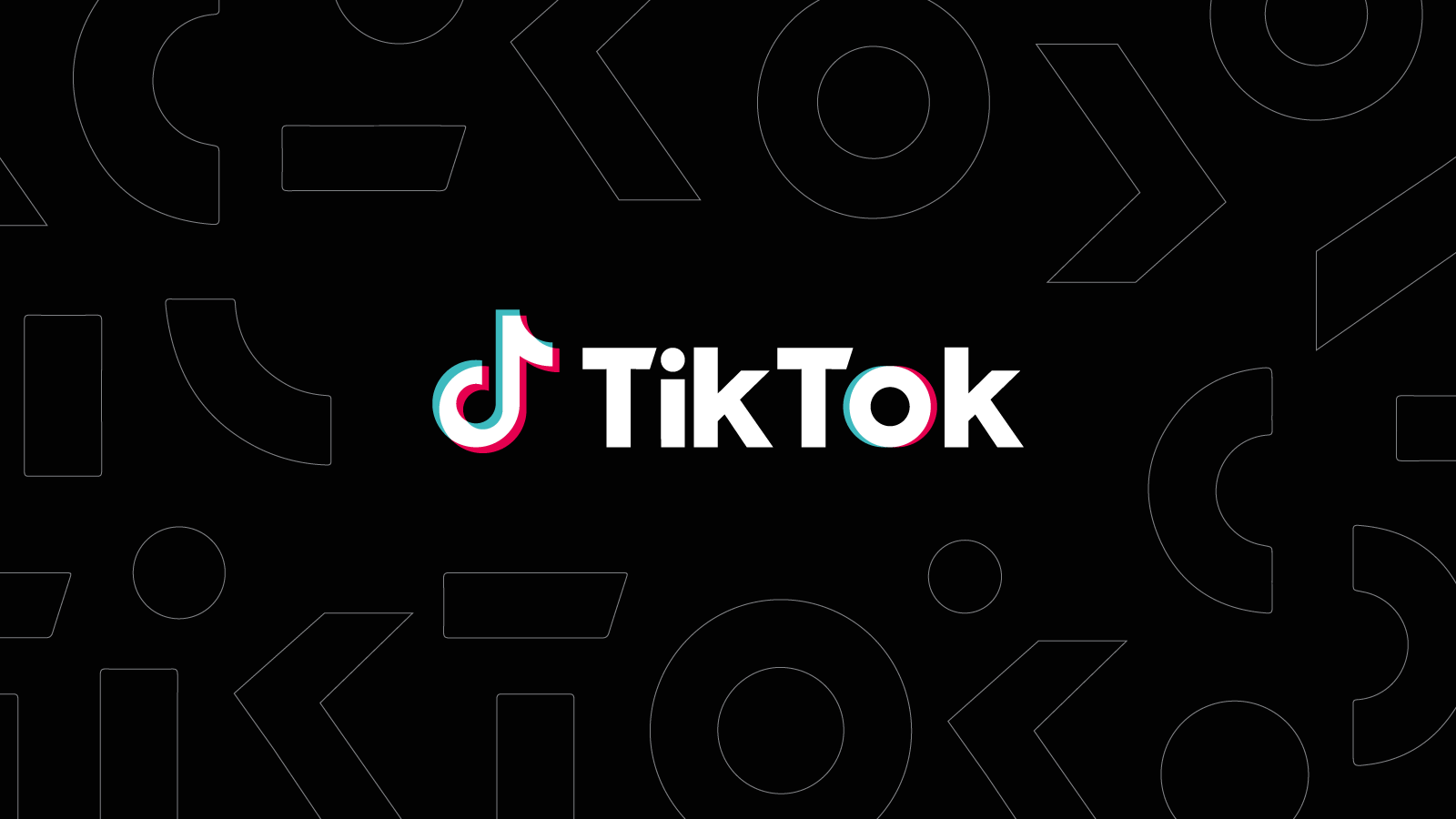
When choosing social media and advertising tools, consider:
- Which platforms are most relevant to your target audience?
- How much time can you dedicate to managing social media and ads?
- What’s your budget for paid advertising?
Remember, successful social media marketing and advertising require a mix of organic content and paid promotions. These tools can help you manage both more efficiently, reaching more potential customers and driving sales.
Are you currently using any of these platforms for your Shopify store? Which social media channel has been most effective for your business so far? And how might integrating these tools into your marketing strategy help you reach new audiences and boost sales?
Conclusion
After exploring the best Shopify marketing apps across various categories, you might be feeling both excited and overwhelmed. With so many powerful tools at your fingertips, where do you start?
Let’s take a step back and consider your main marketing goals. Are you looking to:
- Increase traffic to your store?
- Boost conversion rates?
- Improve customer retention?
The apps you choose should align with these objectives. Remember, you don’t need to implement every tool at once. Start with one or two apps that address your most pressing needs.
For example:
- If abandoned carts are a major issue, prioritize an email marketing app with strong cart recovery features.
- If you’re struggling with SEO, focus on an app that can help optimize your store for search engines.
As you implement these tools, keep track of your key performance indicators (KPIs):
- Are you seeing an improvement in email open rates?
- Has your average order value increased?
- Is there a boost in organic traffic?
Data will be your guide in determining which apps are truly moving the needle for your business.
Don’t forget the power of integration. Many of these apps work best as part of a cohesive strategy. For instance, did you know that combining social proof with upselling can increase conversion rates by up to 12%? That’s according to a study by ConversionXL.
Lastly, always prioritize customer experience. While these apps can significantly enhance your marketing efforts, they should never disrupt the shopping process.
So, what’s your next step? Perhaps it’s time to audit your current marketing tools and identify gaps. Or maybe you’re ready to trial one of the apps we’ve discussed.
Which app do you think could have the biggest impact on your business? How do you plan to measure its success?
Remember, effective marketing is an ongoing process of testing, learning, and optimizing. By leveraging these powerful Shopify apps and continuously refining your approach, you’re well on your way to taking your store’s marketing to the next level.
My Opinion
While these Shopify marketing apps offer powerful tools, I believe the key to success lies in strategic implementation. Focus on understanding your unique customer journey and pain points first. Then, select apps that address those specific needs rather than trying to use every tool available. Remember, less can be more – a well-executed strategy with a few key apps often outperforms a scattered approach using many. Ultimately, the best marketing comes from truly understanding and serving your customers’ needs.